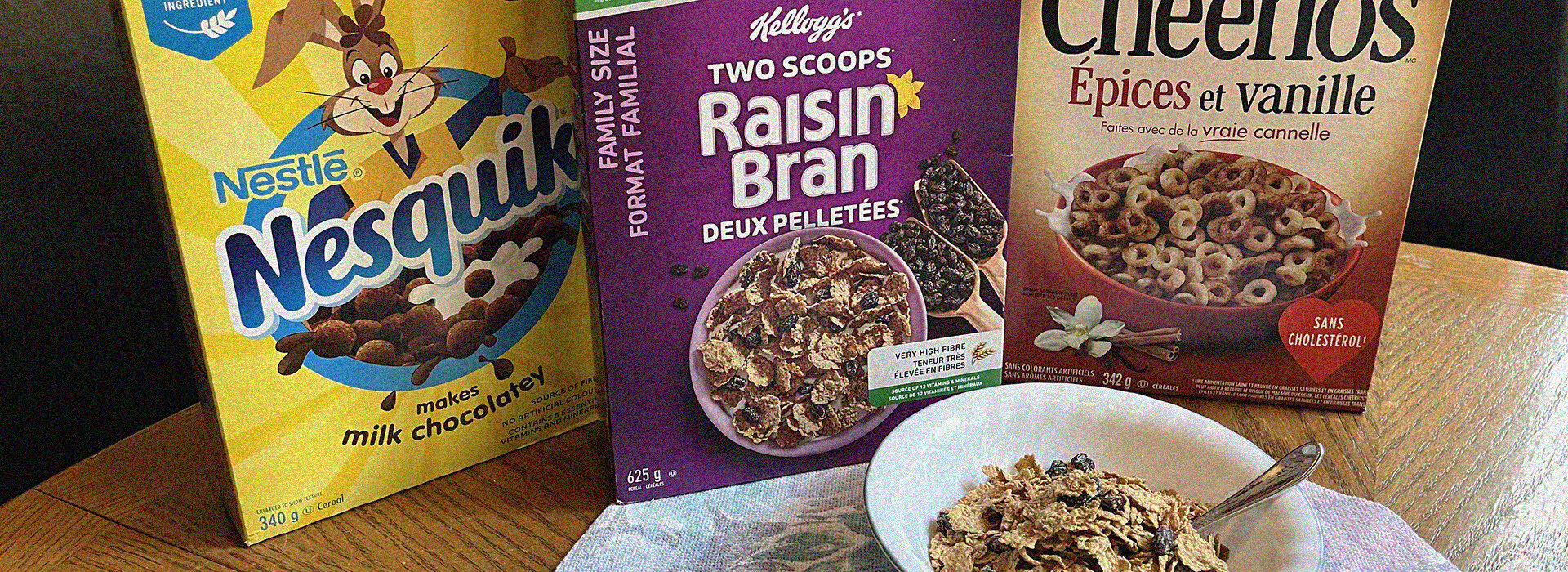8 Realizations about Canadian culture you can only have as a Bilingual French-Canadian
Language is power. Having more than one language gives you a window into how others think, communicate, celebrate, and live. That’s especially true when you’re living in (or travelling around) Canada. Our bilingual country has two official languages, English and French, and with that comes a lot of cultural context and nuance.
I am a French-Canadian who is bilingual in both languages. I grew up in both Ontario and Quebec with my family coming from both parts of Canada. With this backstory, I have context and insight into the French and English Canadian cultures which mystify many travellers exploring the country. Here are eight things I’ve realized about our unique country having grown up the way I did.
1. You can read everything on the back of the cereal box
Before we had phones, we read the backs of the cereal boxes. Since every label has to be in both English and French in Canada, that made for more reading for bilingual kids. Growing up in the early 2000s, we spent a lot of time reading cereal boxes at breakfast to keep ourselves entertained as the sugar kicked in. Assessing the quality of the slogan translation is always good fun as they can be impressively witty, completely off, or somewhere in between. Of course, this applies to more than just cereal boxes: it’s labels, signage, and really everything. When you understand both official languages, you just get a little more out of the everyday stuff around you.

2. You have a broader spectrum of experiences
As a bilingual French-Canadian, you have access to nearly double the resources. For example, you get the full benefit of media offered in the country like TV shows, live sports commentators, movies, the radio, news broadcasts, music, and books. Since neither English nor French evades you, you get it all. You can also go to more festivals, events, and celebrations without feeling lost. Plus, being bilingual does give you more job opportunities in Canada. A lot of employers ask for both English and French, and nearly all government jobs require fluency in both. Another benefit is that travelling within Canada is easier since there won’t be a language barrier (and internationally, you’re likely to have an easier time picking up Latin languages). Except for when you go to Newfoundland… just teasing!
3. You get all the jokes
If you’re a foreign traveller visiting Canada, you may not get the dynamics of all the teasing that goes on between the different regions and dialects. If you speak both French and English and are familiar with both cultures, you understand all the jokes. Expressions in both languages often vary too and it can be hilarious when you try and translate them because some things just cannot be translated. For example, when there’s no one around, in French you say “il n’y a pas un chat” which in English means “there isn’t a cat.” The expression just doesn’t work in English. Whether it’s in conversation with others, in movies, television, radio or books, if you have both French and English, you’ll find twice the humour and all the funny expressions that don’t translate well.
4. You pronounce things differently
What’s the Canadian food that comes to mind for both locals and foreigners alike? Yes, that perfect après-ski, late-night-drunk-food dish that’s made of french fries, fresh cheese curds and hot gravy. The one and only poutine. But how would you pronounce that? Most people say “poo-teen” but it should actually be pronounced “pout-sin.” Now you know!
This goes both ways. For French speakers, the English “th” sound is hard to pronounce so we often turn it into a “d” sound… as in “dis” and “dat.” Growing up in Quebec with an Irish name, I thought my own name was pronounced “Keet” not “Keith” as it should be. How funny is dat?
5. You're familiar with ALL kinds of Canadian food
I grew up with both the Anglo and French food cultures. The French cuisine is very different from the typical Irish meat, potatoes and boiled carrots that I had on the English side of my family. French cuisine uses different base ingredients like mirepoix (celery, carrot, onion), has lots of breads, pastries, rich cream in everything, and often too much cheese (although some would argue that you can never have too much cheese). Dinner with my French-Canadian family is the main event and lasts for hours.
The English food culture, however, has changed with all the international influence we have in our country. It now includes more variety than ever. In Canada, you can easily eat dishes from around the world. More traditional Canadian food is sort of a mix of both French and old English cultures featuring things like tourtière (meat pie), poutine, smoked meat sandwiches, pecan butter tarts, blueberry pie, and maple syrup taffy on snow. To eat the best foods in the country, I highly recommend you visit Montreal.

6. You understand the cultural context
Why are French and English Canadians the way they are? Why are they so different? Of course, they have different roots, but language is also a huge part of it. A different language is synonymous with a different culture. As someone who speaks English and French and grew up with both cultures in Canada, I see how attitude, behaviour, gestures, expressions and ways of being vary between the two. English-speaking Canada is business-oriented, non-confrontational, straightforward, and reserved. French Canada is more socialist, values the quality of life, and is boisterous, opinionated, and less courteous. These cultural differences can be seen as soon as you turn on a TV and switch between French and English channels or venture from Calgary to Montreal to Quebec City or Niagara Falls. It’s sort of embedded in the language. If you’re bilingual in Canada, you always get both sides in a political debate.
7. There's more fun to be had
Some holidays in Quebec vary from those in other parts of Canada. For example, Saint-Jean Baptiste is the National Day in Quebec, celebrating the French culture and pride on the summer solstice. It’s only celebrated in Quebec. There are other traditions and ways of celebrating that are specific to Canada’s French-speaking province. For example, traditional music involves wooden spoons, violin, harmonica and jump-step dancing with funny lyrics. A good traditional tourtière in Quebec is usually made with game meat, so my grandmother often adds my uncle’s catch of the year (bear, moose, elk or deer) into the mix. You can’t knock it ‘till you try it! Then, there’s maple syrup season in March when we go to the cabane à sucre (sugar shack) to eat all the maple goodness. Come to think of it, a lot of French-Canadian celebrations revolve around food… but that’s fine by me! For a serious cultural experience visit Quebec City in February during Carnival or during maple season in March.
8. You have the advantage of a dual identity
After growing up fully immersed in both English and French Canadian cultures and languages, I must say the biggest and most obvious realization I’ve had is about identity and having a sense of community everywhere. If you’re bilingual in Canada, you’ll have an understanding of people that others will miss. Knowing the languages also means you have a different perspective. That makes you capable of making more friends, building strong relationships and bonding with anyone across the country. If you are bilingual, you’ll have two identities. I don’t always know which side I want to be labelled as so I give people my entire backstory instead. Sometimes, I identify with whichever one is best for that social situation, but generally, I’m both English and French Canadian and I love it that way.


